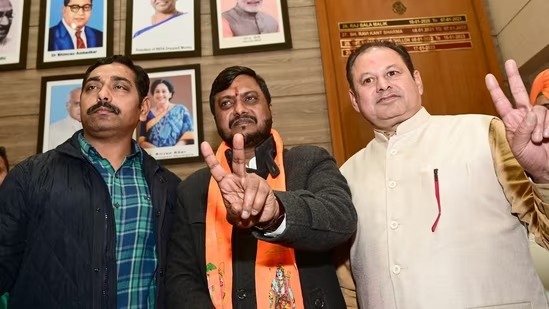In a stunning turn of events, Chandigarh Mayor Manoj Sonkar, representing the Bharatiya Janata Party (BJP), tendered his resignation from the prestigious post on Sunday, plunging the Union Territory into a whirlpool of political uncertainty. Sonkar’s resignation precedes an impending hearing in the Supreme Court regarding the legitimacy of his election, adding fuel to the already blazing political fire.
The resignation of Sonkar, a pivotal figure in the BJP’s local leadership, has set the stage for fresh elections to select a new Mayor for the capital city shared by Punjab and Haryana. With the BJP now in a position to reclaim the mayoral seat, the political landscape is ripe with anticipation and strategising.
Adding to the political upheaval, the Aam Aadmi Party (AAP) faced a significant setback as three of its councillors defected to the BJP camp. Neha Musawat, Poonam, and Gurcharan Kala formally embraced the BJP, a move orchestrated by BJP General Secretary Vinod Tawde. This defection tilts the balance of power in the Municipal Corporation, with the BJP bolstering its councillor count to 18, leaving AAP with a diminished count of 10. The Congress holds sway with 7 councillors, while the Shiromani Akali Dal (SAD) retains a solitary councillor.
Councilor Gurcharan Kala cited pressure tactics employed by the AAP as the impetus behind his decision to switch allegiance. He expressed admiration for Prime Minister Modi’s governance and cited it as a motivating factor for joining the BJP. Similar sentiments were echoed by Neha Musawat, who levied allegations against the AAP, further deepening the political rift.
In the intricate web of Chandigarh’s municipal politics, the selection of the Mayor hinges on the collective decision of the 36 councillors. With the recent realignment, the BJP commands the support of 17 councillors, one Member of Parliament (MP), and the lone SAD councillor. In contrast, the AAP and Congress alliance finds itself with a combined tally of 17 votes. The evolving political dynamics have strained the AAP’s ability to secure Congress’ backing, particularly after the former’s decision to contest the Punjab-Chandigarh Lok Sabha elections independently.
Meanwhile, the Supreme Court is set to convene today (February 19, 2024) to deliberate on the unfolding political drama. The genesis of this turmoil traces back to the contentious mayoral elections held on January 30, where Manoj Sonkar clinched victory amidst allegations of electoral malpractice. The AAP-Congress coalition contested the legitimacy of Sonkar’s win, prompting Supreme Court intervention and the summons of election officer Anil Masih to address allegations of irregularities.
In response to Sonkar’s resignation, the BJP offered clarification, citing relentless opposition obstructionism as the catalyst behind the move. Allegations of hindering effective governance prompted Sonkar to step down, marking a pivotal moment in Chandigarh’s political chronicle. Notably, the AAP fielded Kuldeep Dholor as Sonkar’s challenger in the last elections, culminating in Sonkar’s triumph despite the AAP’s fervent opposition.
As Chandigarh braces for a fresh political contest, the spectre of uncertainty looms large, with the mayoral seat serving as the focal point of a riveting political saga.




















Comments